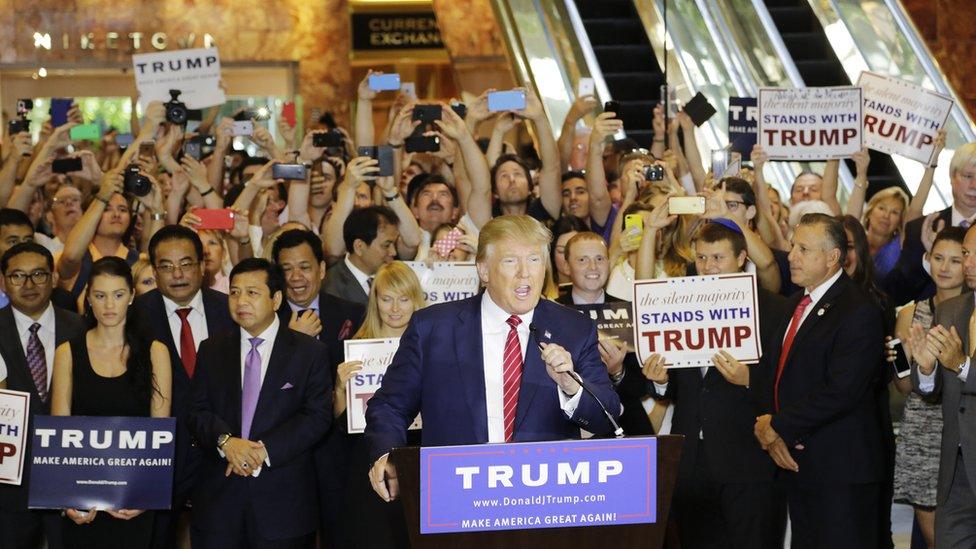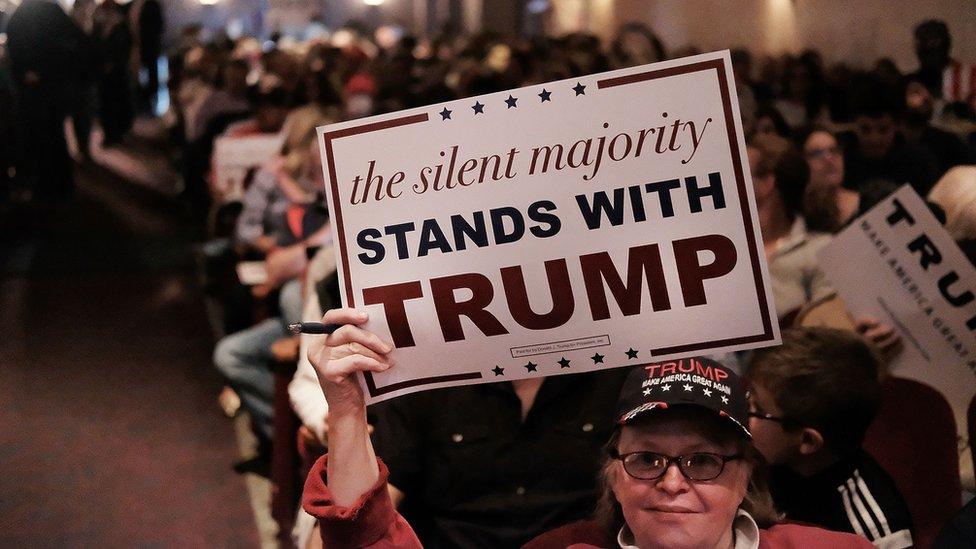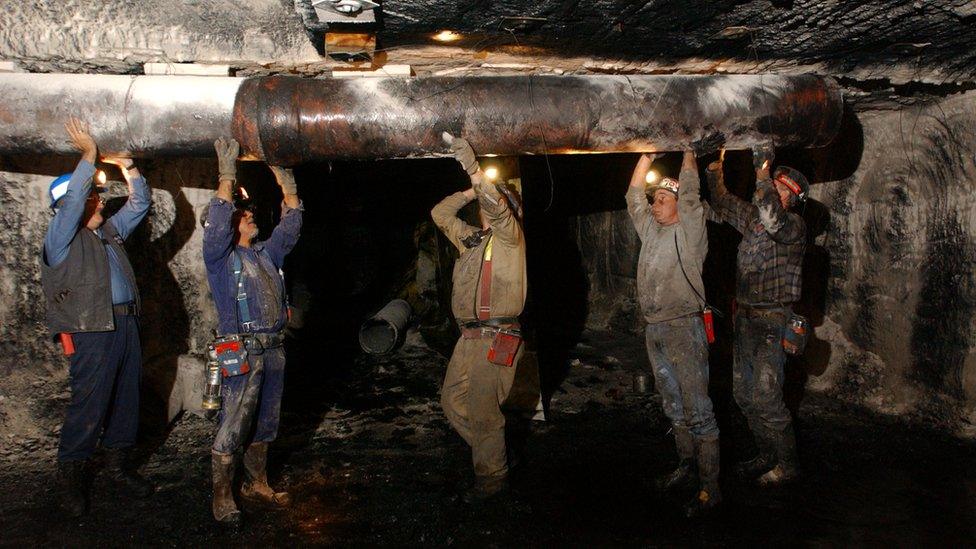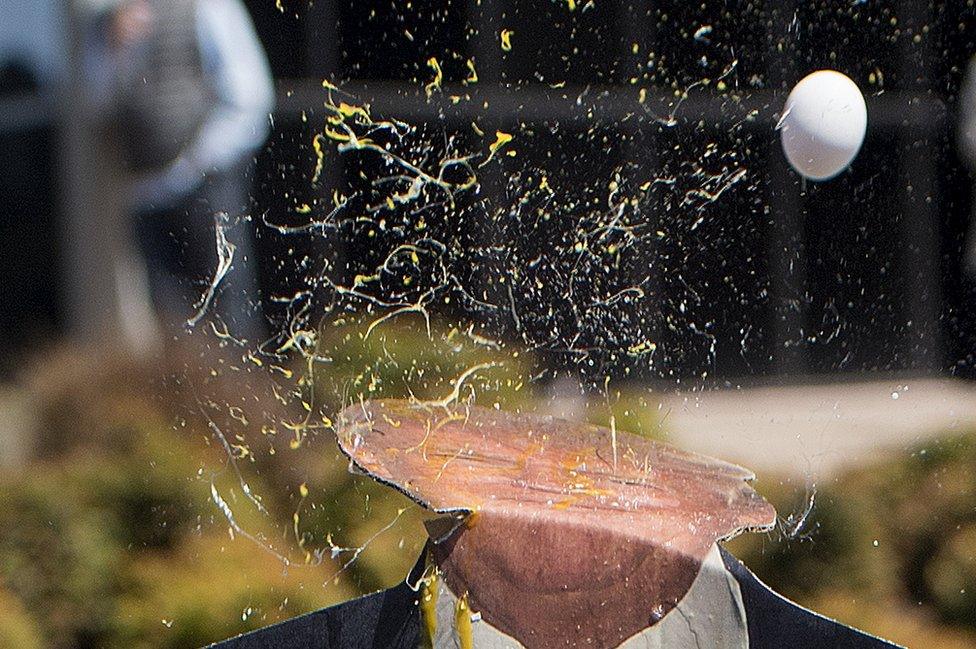US election: How Trump defied all predictions
- Published

Trump's campaign launch was met with mockery... not any more
America tonight stands on the doorstep of greatness, or the precipice of doom.
Under a candidate this divisive, there's not much room for feeling anything in between, as the realisation dawns that Donald Trump now has a plausible shot at being America's next president.
There has never been a candidate for the White House quite like this. He came into the race something of a joke, he conducted his campaign in ways that sometimes seemed like a joke (remember the steaks) but he won the nomination with totally serious conviction, demolishing his large field of competitors.
One by one, the primary wins stacked up and the other candidates fell. It was extraordinary to watch. The man almost no-one in the American political world took seriously defied all the predictions.

Trump supporters say he's the only candidate that speaks for them
How did he do it?
Trump tapped into something we all should have seen, but failed to. For years, working class Americans have suffered from low employment and stagnant wages. They've watched the spread of globalisation, immigration and free trade and they felt left behind.
The US economy appeared to boom, but their lives didn't reflect that triumph. They had got a bad deal. Add to that an America that seemed to have faltered on the global stage and a president congenitally averse to nationalistic chest-thumping and Donald Trump was a gift.
From the billionaire's New York penthouse, he somehow understood the concerns of less educated Americans, particularly less educated American men.

The coal industry in places like Pennsylvania has been drawn to Trump's message
He appeared to have an intuitive understanding of their loves and hates. He even said at one point in this absurdly long campaign that he loved the poorly educated. He knew they felt shackled by political correctness, and he gave them freedom to rail against it.
He knew they were afraid that their country was changing around them, increasingly populated by people whose first language was Spanish not English. When he suggested that Mexico was sending rapists across the border, he vindicated those fears. When he proposed to ban all Muslims from America, he gave voice to the anti-Islamic sentiment that's simmered in the US since 9/11.
It has been a remarkable display of political instinct from a man who's never been in politics. His supporters are so devoted to him that he could do no wrong. When he said Vietnam torture victim and war vet Senator John McCain wasn't a war hero, his approval ratings went up.
When he suggested a female reporter posed a tough question because she was menstruating, his numbers improved again.
Mexico, Muslims, Lyin' Ted... they all just fuelled the Trump train. And they love him most because he doesn't sound like all the politicians who have promised much and delivered little.

The southern border has become a key Trump issue
And yet, at the risk of being churlish on the night Mr Trump celebrates a stunning victory, it is worth noting how he has also alienated millions of Americans in a way we have not seen here in modern history.
Never has a candidate for the presidency been this reviled and rejected by some members of their own party. There is a long list (literally, you can find it on the website of The Hill newspaper, external) of Republican politicians and strategists who have said they will never vote for Trump.
In private there are many more who have said they will vote for Hillary rather than Donald.
These are the people - and I have spoken to many of them - who say their party's candidate is a "bigot", "racist", "misogynist". They call him "crass", "rude", "a bully".
Some of these people may now fall in line with the party leadership, hold their nose and tick the Trump box, but they don't like him.
If you broaden the surveys out to all Americans, Trump breaks records with his unfavourability ratings.

Protests against Trump are common in California
Which is why two groups are cheering tonight, team Trump and team Clinton.
The Clinton campaign remains convinced that this is the perfect race for them. They see Trump's negatives and they believe he is the best candidate they could have hoped for as their Republican opponent.
Moreover, the demographics of America would suggest that whoever is the Democratic nominee stands an odds-on chance of winning the White House - there are just more Democratic than Republican voters in the country.
But this is a curious year, the political rule book has been shredded and Donald Trump hates losing almost more than he loves winning.
The Clinton camp would be wrong to get too confident too soon. If we have learned one thing in this crazy campaign, it is that predictions are foolish.
Call me a fool, but I'm prepared to make just one more - the Clinton-Trump match-up is going to be brutal.
You thought the last 24 hours was ugly. You haven't seen anything yet.